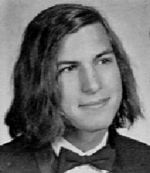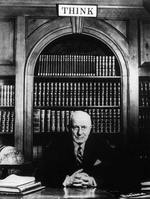One reason why, at 52, I sometimes write like an impatient teenager has to do with technology’s myth of adult supervision.
When I started writing about tech, in the 1980s, it was assumed that young entrepreneurs needed someone more seasoned at the helm, or their companies could not be taken seriously. So Microsoft took on a collection of gray-haired old farts, as did Apple, and Apple’s old fart tossed Steve Jobs (left) out on his ear.
We know how that worked out, but these clowns were still doing it in the 1990s, when Yahoo burst on the scene. They demanded Jerry Yang and David Filo get some "adult supervision," which they did.
Once again, it didn’t work out. Tim Koogle (the story on that link tells everything) and Terry Semel have been failures at the helm of Yahoo. I would assert the only reason Eric Schmidt hasn’t mucked-up Google is that he is mainly a figurehead — founders Larry Page and Sergey Brin still retain a measure of control. (Please remember the great job Schmidt did at Novell.)
When magazines like Business Week claim that young entrepreneurs should give up control of their companies, they’re speaking for old farts who want to steal them.
From the perspective of years the truth is simpler than youth and age.
All companies are entrepreneurial. Their fates are, for better or
worse, tied up in the strengths and weaknesses of their founders. Do
away with that, and you’ve cut off the company’s head, no matter what
color the hair on it.
Most executives, regardless of where they went to school, or what’s on
their resumes, are just glorified yes-men in the end. The power to
imagine something that never existed, the power of the entrepreneur, is
all the power most businesses need, or have.
Don’t forget it. (To the right, Thomas Watson Sr., who founded IBM from a collection of office equipment companies, starting in 1915.)












There is a balance to strike. In the beginning of this decade, I was involved with a dot-com where the CEO/Founder didn’t have “adult supervision”. He was in his early 40s at the time, and was probably the right guy to run the company when it was a consulting company before it was funded, but not the right guy after funding when it was a product company. Absolutely brilliant engineer, but in a million parallel lifeltimes, he would never be effective making a product company successful. And I think the tech world is truly poorer for it.
I also was fortunate to witness an entrepreneur bringing in a competent adult to run a company. This company is discussed in Arnold Kling’s Under the Radar and the entrepreneur is a long time friend of mine. He brought in someone to manage the day to day operations of his company, yet kept control of R&D, and I helped him do some pretty nifty stuff. I think with the Steve Jobs example, where Sculley screwed up was not allowing Jobs to fail. Let Jobs do what he wants, give him a two-year leash on any pet project, if he succeeds great, if he fails, no big loss. The CEO and entrepreneur should be partners and know they need each other. The still unresolved stock options shenanagans at Apple are why a professional CEO working with entrepreneur Steve Jobs would be a much safer situation and could still be just as successful.
There is a balance to strike. In the beginning of this decade, I was involved with a dot-com where the CEO/Founder didn’t have “adult supervision”. He was in his early 40s at the time, and was probably the right guy to run the company when it was a consulting company before it was funded, but not the right guy after funding when it was a product company. Absolutely brilliant engineer, but in a million parallel lifeltimes, he would never be effective making a product company successful. And I think the tech world is truly poorer for it.
I also was fortunate to witness an entrepreneur bringing in a competent adult to run a company. This company is discussed in Arnold Kling’s Under the Radar and the entrepreneur is a long time friend of mine. He brought in someone to manage the day to day operations of his company, yet kept control of R&D, and I helped him do some pretty nifty stuff. I think with the Steve Jobs example, where Sculley screwed up was not allowing Jobs to fail. Let Jobs do what he wants, give him a two-year leash on any pet project, if he succeeds great, if he fails, no big loss. The CEO and entrepreneur should be partners and know they need each other. The still unresolved stock options shenanagans at Apple are why a professional CEO working with entrepreneur Steve Jobs would be a much safer situation and could still be just as successful.
Brad, why not the entrepreneur as CEO and the professional manager as COO? Especially as a company grows larger, the CEO should be focused on strategy, not day-to-day operations.
Brad, why not the entrepreneur as CEO and the professional manager as COO? Especially as a company grows larger, the CEO should be focused on strategy, not day-to-day operations.
Jesse, there is a balance to strike and every situation is different. I don’t know many entrepreneurs who are good at strategy. Frankly, I’m not so convinced that anyone is really good at business strategy, but with the benefit of a large budget, solid fundamentals, and good fortune, some will look good in retrospect. Think Steve Jobs a moment… If the iPod didn’t become a wild market dominator, then Apple today is less than half the size it is, there is no iPhone, no Apple TV playing YouTube videos. Apple is that company that made candy colored computers a decade ago, and Jobs’ reputation as “master strategist” ain’t there.
Good entrepreneurs are good at a few things: (1) identify a market opportunity, (2) get a product/service to market fast, (3) find customers, (4) squeeze a profit. Really good entrepreneurs are great at: (5) taking credit and (6) sticking the failures on someone else ;-). Any entrepreneur who starts on her kitchen table or her garage and thinks she should be CEO of a public company is smoking crack. If you go 1 for 5 as an entrepreneur over your career, everyone will be proud of your success. If you bat less than 1000 as a CEO, you’re out. Carley Fiorina, Gil Amelio, Bill Ford Jr. DANA!! HOW COULD YOU FORGET BILL FORD JR IN WRITING YOUR POST?!? Sorry to shout, but that grandson on Henry is no dummy, took a very entrepreneurial approach as CEO, and ran that company so into the ground it will be lucky to recover. All he had to do was sell F-150s, Explorers, and Mustangs, but he went off on a hybrid tangent when Ford was 1/2 decade behind and there was only room for one player in the hybrid market.
Jesse, there is a balance to strike and every situation is different. I don’t know many entrepreneurs who are good at strategy. Frankly, I’m not so convinced that anyone is really good at business strategy, but with the benefit of a large budget, solid fundamentals, and good fortune, some will look good in retrospect. Think Steve Jobs a moment… If the iPod didn’t become a wild market dominator, then Apple today is less than half the size it is, there is no iPhone, no Apple TV playing YouTube videos. Apple is that company that made candy colored computers a decade ago, and Jobs’ reputation as “master strategist” ain’t there.
Good entrepreneurs are good at a few things: (1) identify a market opportunity, (2) get a product/service to market fast, (3) find customers, (4) squeeze a profit. Really good entrepreneurs are great at: (5) taking credit and (6) sticking the failures on someone else ;-). Any entrepreneur who starts on her kitchen table or her garage and thinks she should be CEO of a public company is smoking crack. If you go 1 for 5 as an entrepreneur over your career, everyone will be proud of your success. If you bat less than 1000 as a CEO, you’re out. Carley Fiorina, Gil Amelio, Bill Ford Jr. DANA!! HOW COULD YOU FORGET BILL FORD JR IN WRITING YOUR POST?!? Sorry to shout, but that grandson on Henry is no dummy, took a very entrepreneurial approach as CEO, and ran that company so into the ground it will be lucky to recover. All he had to do was sell F-150s, Explorers, and Mustangs, but he went off on a hybrid tangent when Ford was 1/2 decade behind and there was only room for one player in the hybrid market.
“Good entrepreneurs are good at a few things: (1) identify a market opportunity, (2) get a product/service to market fast, (3) find customers, (4) squeeze a profit.”
These are exactly the things a CEO should be doing.
Clearly Bill Ford Jr wasn’t a good entrepreneur or CEO because he failed at all 4 of these things. Anyway, Ford (and GM and Chrysler) all fell apart in this decade because they don’t have a single model, outside the Corvette (which actually loses money for GM) and gas-guzzling heavy trucks, that isn’t done better by a foreign competitor. What is really killing them, though, is their deals with dealerships that force them to maintain useless product lines like Dodge, Mercury, Pontiac, etc. That is a huge waste of resources that could better be applied elsewhere.
“Good entrepreneurs are good at a few things: (1) identify a market opportunity, (2) get a product/service to market fast, (3) find customers, (4) squeeze a profit.”
These are exactly the things a CEO should be doing.
Clearly Bill Ford Jr wasn’t a good entrepreneur or CEO because he failed at all 4 of these things. Anyway, Ford (and GM and Chrysler) all fell apart in this decade because they don’t have a single model, outside the Corvette (which actually loses money for GM) and gas-guzzling heavy trucks, that isn’t done better by a foreign competitor. What is really killing them, though, is their deals with dealerships that force them to maintain useless product lines like Dodge, Mercury, Pontiac, etc. That is a huge waste of resources that could better be applied elsewhere.